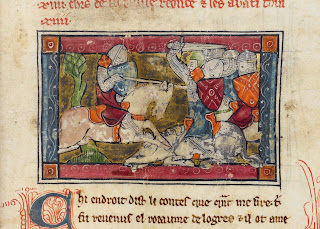The romance of Tristan and Isolde is one of the most enduring and widely disseminated romances of the Middle Ages, and it was known in numerous renditions, adaptations and translation. In the mid-12th century, an Anglo-Norman verse rendition was written at the court of Henry II by an author known only by his first name, Thomas. This work survives only in fragmentary form, and was probably written for Eleanor of Aquitaine. M. Dominica Legge suggests that it was through the Angevins this work was transmitted to other countries. Through her daughters the opus most likely travelled to Spain, Sicily and Germany, and by 1226 it had also been rendered into Norwegian.
-+Prose+Tristan,+Tristan+battling+fourteen+knights+of+the+round+table.jpg)
Tristan battling fourteen knights of the round table, from the Prose Tristan
MS. Additional 5474, French, last quarter of the 13th century
Courtesy of British Library
The poem I want to present to you is a short Spanish ballad written sometime in the 15th or 16th centuries, known as Romance de Don Tristán. It depicts Tristan's death, but from the vantage point of an unknown female figure who concludes the narration with a strange story of her pregnancy. How this relate to the story of Tristan's death I do not know, but it is presumably an allusion to the Virgin Mary and the lily of the Annunciation. The translation is by J. M. Cohen.
Romance de Don Tristán
Herido está Don Tristán - de una mala lanzada,
diérasela el Rey su tío - con una lanza herbolada.
Diósela desde una torre, - que de cerca non osaba.
Que el hierro tiene en el cuerpo, - de fuera le tiembla el asta;
valo a ver la reina Iseo, - la su linda enamorada,
cubierta de un paño negro, - que de luto se llamaba.
Viéndole tan mal parado - dice así la triste dama:
"Quien te hirió, Don Tristán - heridas tenga de rabia,
Romance de Don Tristán
Herido está Don Tristán - de una mala lanzada,
diérasela el Rey su tío - con una lanza herbolada.
Diósela desde una torre, - que de cerca non osaba.
Que el hierro tiene en el cuerpo, - de fuera le tiembla el asta;
valo a ver la reina Iseo, - la su linda enamorada,
cubierta de un paño negro, - que de luto se llamaba.
Viéndole tan mal parado - dice así la triste dama:
"Quien te hirió, Don Tristán - heridas tenga de rabia,
que no hallase maestro - que sopiese de sanallas."
Júntanse boca con boca - como palomillas mansas,
llora el uno, llora el otro, - la cama bañan en agua;
Júntanse boca con boca - como palomillas mansas,
llora el uno, llora el otro, - la cama bañan en agua;
allí nace un arboledo - que azucena se llamaba,
cualquer mujer que la come - luego se siente preñada.
!Así hice yo, mezquina, - por la mi ventura mala!
Romance of Sir Tristram
Sir Tristram has been wounded by an evil lance-thrust, which the King his uncle gave him with a poisoned lance. He dealth it him from a tower, for he dared not come near. He has the iron in his body, and the haft trembles without; Queen Iseult, his lovely mistress, goes to see him, swathed in black cloth which was called the (cloth of) mourning.
Seeing him in such an evil plight, the sorrowful lady said: 'May he who wounded you, Sir Tristram, suffer in agony. For there is no surgeon to be found skilled enough to cure your wounds.'
They put their mouths together like tame turtle-doves. The one weeps, the other weeps, they bathe the bed in tears. There grew a bush that was called the white lily; any woman who eats of it immediately feels herself pregnant. I did so, poor girl that I am, to my own misfortune.
References
Cohen, J. M. (ed. and transl.), The Penguin Book of Spanish Verse, Penguin Books, 1988
Legge, M. Dominica, Anglo-Norman Literature and its Background, Clarendon Press, 1963
Rindal, Magnus (transl.), Soga om Tristram og Isond, Det Norske Samlaget, 2003
!Así hice yo, mezquina, - por la mi ventura mala!
Romance of Sir Tristram
Sir Tristram has been wounded by an evil lance-thrust, which the King his uncle gave him with a poisoned lance. He dealth it him from a tower, for he dared not come near. He has the iron in his body, and the haft trembles without; Queen Iseult, his lovely mistress, goes to see him, swathed in black cloth which was called the (cloth of) mourning.
Seeing him in such an evil plight, the sorrowful lady said: 'May he who wounded you, Sir Tristram, suffer in agony. For there is no surgeon to be found skilled enough to cure your wounds.'
They put their mouths together like tame turtle-doves. The one weeps, the other weeps, they bathe the bed in tears. There grew a bush that was called the white lily; any woman who eats of it immediately feels herself pregnant. I did so, poor girl that I am, to my own misfortune.
References
Cohen, J. M. (ed. and transl.), The Penguin Book of Spanish Verse, Penguin Books, 1988
Legge, M. Dominica, Anglo-Norman Literature and its Background, Clarendon Press, 1963
Rindal, Magnus (transl.), Soga om Tristram og Isond, Det Norske Samlaget, 2003
Ingen kommentarer:
Legg inn en kommentar